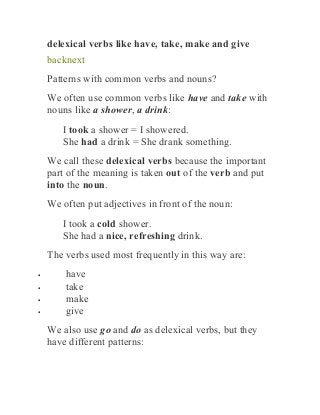
Delexical verbs like have, take, make and give
- 1. delexical verbs like have, take, make and give backnext Patterns with common verbs and nouns? We often use common verbs like have and take with nouns like a shower, a drink: I took a shower = I showered. She had a drink = She drank something. We call these delexical verbs because the important part of the meaning is taken out of the verb and put into the noun. We often put adjectives in front of the noun: I took a cold shower. She had a nice, refreshing drink. The verbs used most frequently in this way are: • have • take • make • give We also use go and do as delexical verbs, but they have different patterns:
- 2. Shall we go swimming this afternoon? Or shall we go for a walk? It’s you turn to do the cooking. I’ll have to do my hair before the party. • We use have with: Food and drink: a meal; breakfast, lunch, dinner, a snack, a cup of tea Talking: a chat, a conversation, a discussion, a talk, Washing: a bath, a shower, a wash, a scrub Resting: a break, a holiday, a rest Disagreeing: argument, dispute, fight, quarrel I had a good breakfast before I left home. We had a long talk about the problem. The kids should have a bath before they go to bed. She generally had a short holiday in July or August. They had a serious quarrel about their father’s will. • We use take with: Washing: a bath, a shower, a wash Resting: a break, a holiday, a rest
- 3. I always take a cold shower in the morning You look tired. You need to take a break. … and with these words: care, care of, a chance, a risk, a decision, a photograph, trouble, a turn, turns We took hundreds of photographs on holiday. Jane always takes a lot of trouble with her homework. • We also use have and take with nouns formed from verbs: I think you should have a look at this. She took a bite of the cake. I’m thirsty. I’m going to have a drink of water. I had a listen to that new CD in the car. They are going to have a swim. • We use give with: Noises: a cry, a laugh, a scream, a shout, a whistle Facial expressions: a smile, a grin, a look, a glance Hitting: a kick, a punch, a slap, a push, a knock,
- 4. a blow Affectionate actions: a hug, a kiss, a stroke, Talking: advice, an answer, information, an interview, a lecture, some news, a report, a speech, a talk, a warning. She gave a loud laugh. John gave a happy smile. He gave me a nasty kick on the leg. She gave the children a goodnight kiss and put them to bed. I have to give a speech at the meeting tomorrow. • We use make with: Talking: and sounds: a comment, an enquiry, a noise, a point, a promise, a sound, a speech, a suggestion Plans: arrangements, a choice, a decision, a plan, plans Travel: a journey, a trip, a tour of, a visit to • We use go with an -ing verb or for common activities: We usually go walking at the weekend. He goes running every evening after supper. Mum’s out. She’s gone shopping.
- 5. • We use go for a with a verb for common activities that involve moving: a jog, a ride, a swim, a run, a stroll, a walk I want to get out of here. Let’s go for a walk. He’s gone for a ride on his bike. • We use do the with -ing nouns to do with work, especially work in the house, and with other nouns to do with work: It’s your turn to do the cooking. You do the washing up and I’ll do the drying. I need to do a few jobs around the house. I can’t come out this evening. I have a lot of work to do. • We use do with nouns when it is obvious what the action is: I’ll have to do my hair before we go out [= I’ll have to brush my hair.] Have you done your teeth? [= Have you cleaned your teeth?] A question like: Have you done the car? could mean:
- 6. Have you washed the car? or Have you mended the car? or Have you filled the car with petrol? depending on the context
